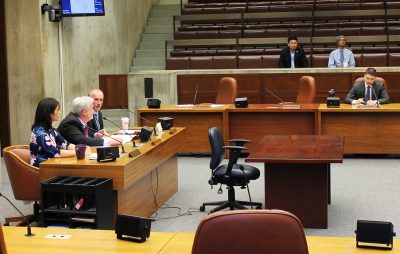
The Boston City Council met with representatives of the Boston Elections Department to discuss the department’s Split Precinct Proposal on Thursday afternoon at City Hall.
The proposal calls for a special law that would divide six disproportionately large voter precincts throughout the city of Boston into smaller sub-precincts, more equally dividing voters, City Council President Michelle Wu, a sponsor of the proposal, told The Daily Free Press before the meeting.
Wu said Boston’s 255 precincts have been exempt from reconfiguration for over 50 years, something that all other Massachusetts cities and towns are subject to every 10 years, yielding many disproportionate “mega-precincts.”
Information in a slideshow presented during the meeting showed the largest of these “mega-precincts” is an area in Chinatown, which has nearly 6,000 registered voters — more than 10 times the number of registered voters in some of the smallest precincts.
Wu said the size of these six precincts restricts access to voting sites.
“These downtown precincts are the ones where we see people having to wait two hours or more just to get to vote,” Wu said. “People are busy, they’re working, they’re trying to stop in, they may need to go take care of their kids. This is really a barrier to voter access.”
Wu said she believes the proposed legislation to split the precincts would make it easier for voters to get to the polls in these areas of concern.
“By splitting them that means that people can get to the ballot faster, and have an easier time actually having their voices heard at the polling place,” Wu said.
During the meeting, councilors discussed how the lines subdividing the precincts were drawn, and what demographics were considered in the process. Wu said the Elections Department drew the lines based on present and projected data.
“[The Elections Department] looked at current registered voters and populations as well as future projections … they accounted for that as well so that these lines should last for a number of years,” Wu said. “The goal is to divide these in a way that are simple, straight lines, so that it’s sort of intuitive, but also makes sense in terms of equalizing the number of people per sub-precinct.”
Dion Irish, the chairman of the Boston Elections Commission, spoke at the hearing on behalf of the Elections Department to propose the measure. Irish said the measure is an important solution to the issue of low voter turnout.
“We do need to take long-term steps to address this, and I look forward to discussions,” Irish said. “However, we also need to take short-term measures such as this to ensure that all of our voters are afforded reasonable wait times.”
Irish appealed to the council to accelerate the process as much as possible in order to have the new zoning in place for upcoming elections.
“Voter access and equal opportunity for all voters is very important to the Elections Department, to the Board of Elections Commission and Mayor [Martin] Walsh,” Irish said. “I know that voter access is also important to all members of City Council, so I’m hopeful that we can pass this measure in time for our upcoming municipal elections.”
If the measure is approved by City Council, then it will go to Mayor Walsh for his approval before reaching the Massachusetts State House for the state legislature to approve it as well, according to Wu. The bill needs to be approved at both the city and state level before June in order to have enough time to implement the measure for the 2017 elections.
Janet Maloof, 64, of the West End, a poll worker in Boston, said she and her husband were motivated to attend the meeting by their experience working at the polls over the last election.
“We thought this was really a serious issue because of the last election,” Maloof said. “I worked at City Hall, and felt that there were just too many people for us to reasonably handle.”
Maloof said she supports the measure because she thinks the voters deserve easier access to the polls.
“The people were extraordinarily kind and patient, and I think that they deserve to have a review of what we can do to make this a better experience,” Maloof said. “We want as many people [as possible] to participate, that’s the idea.”
















































































































